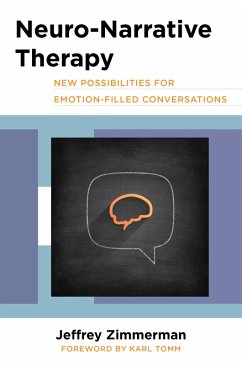Bringing interpersonal neurobiology and narrative therapy together.
Narrative therapy understands storytelling as the way we make sense of ourselves and life experience. Many non-narrative therapists have expressed great admiration and interests in the politics the work exposes, the way it brings in the socio-political context, and the way it centers clients. Yet despite its popularity and success as a useful therapeutic approach, Narrative Therapy has been criticized as minimizing and failing to develop any extended discussion of something vital to our lives: emotion.
Neuro-Narrative Therapy attempts to redress this problem by taking us first through standard Narrative practices, and then showing how and where affect can be brought in and even privileged in the work.
After situating the evolution of Narrative Therapy in its historical context, the book provides information about why emotions should be given an important place in the work. Specifically, it brings ideas and implications of some of the most exciting and novel theoriesinterpersonal neurobiology and affective neuroscienceto the practice of Narrative Therapy.
Readers will learn about the growing emphasis on the right brain, and how an understanding of the ways in which emotion and affect are manifested by the brain can help us help our clients. The possibilities for this new approach are many: a freer discussion of the emotional side of your clients; an understanding and sensitivity to the relation of body and mind; attention to how the therapeutic relationship of our clients can become a resource in treatment and a renewed understanding of how our memoriesand thus our stories about our livesdevelop in early childhood and beyond.
For any therapist working in the area of Narrative Therapy, and for any interested in the emerging understandings that science is bringing to appreciating how our brains develop with and among each other, this book has something to offer. Combining the neuro- and the narrative, as Jeffrey Zimmerman has done here, will create a new direction in Narrative Therapy, one in which our brain and body work together, inviting a more direct and effective engagement with clients.
Narrative therapy understands storytelling as the way we make sense of ourselves and life experience. Many non-narrative therapists have expressed great admiration and interests in the politics the work exposes, the way it brings in the socio-political context, and the way it centers clients. Yet despite its popularity and success as a useful therapeutic approach, Narrative Therapy has been criticized as minimizing and failing to develop any extended discussion of something vital to our lives: emotion.
Neuro-Narrative Therapy attempts to redress this problem by taking us first through standard Narrative practices, and then showing how and where affect can be brought in and even privileged in the work.
After situating the evolution of Narrative Therapy in its historical context, the book provides information about why emotions should be given an important place in the work. Specifically, it brings ideas and implications of some of the most exciting and novel theoriesinterpersonal neurobiology and affective neuroscienceto the practice of Narrative Therapy.
Readers will learn about the growing emphasis on the right brain, and how an understanding of the ways in which emotion and affect are manifested by the brain can help us help our clients. The possibilities for this new approach are many: a freer discussion of the emotional side of your clients; an understanding and sensitivity to the relation of body and mind; attention to how the therapeutic relationship of our clients can become a resource in treatment and a renewed understanding of how our memoriesand thus our stories about our livesdevelop in early childhood and beyond.
For any therapist working in the area of Narrative Therapy, and for any interested in the emerging understandings that science is bringing to appreciating how our brains develop with and among each other, this book has something to offer. Combining the neuro- and the narrative, as Jeffrey Zimmerman has done here, will create a new direction in Narrative Therapy, one in which our brain and body work together, inviting a more direct and effective engagement with clients.
Dieser Download kann aus rechtlichen Gründen nur mit Rechnungsadresse in A, D ausgeliefert werden.

